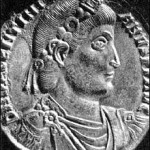Jovian, the successor of Julian, was a short-lived and inglorious emperor who reestablished Christianity and exchanged land for peace (when decisive action may have saved the army without the need for a treaty). Jovian withdrew from the five Roman provinces east of the Tigris, which had been conquered by Galerius in 298 and gave up the fortresses of Nisibis, Castra Maurorum and Singara to the Persians.
As Gibbon writes, in chapter 24 (the recording of which was unfortunately erased before I had a chance to post it here):
Sapor enjoyed the glory and the fruits of his victory; and this ignominious peace has justly been considered as a memorable aera in the decline and fall of the Roman empire. The predecessors of Jovian had sometimes relinquished the dominion of distant and unprofitable provinces; but, since the foundation of the city, the genius of Rome, the god Terminus, who guarded the boundaries of the republic, had never retired before the sword of a victorious enemy.
Jovian died in bed in his tent after “indulging himself with a plentiful, perhaps an intemperate, supper.” Gibbon does not seem to think that he was poisoned.
The cause of this sudden death was variously understood. By some it was ascribed to the consequences of an indigestion, occasioned either by the quantity of the wine, or the quality of the mushrooms, which he had swallowed in the evening. According to others, he was suffocated in his sleep by the vapor of charcoal, which extracted from the walls of the apartment the unwholesome moisture of the fresh plaster. But the want of a regular inquiry into the death of a prince, whose reign and person were soon forgotten, appears to have been the only circumstance which countenanced the malicious whispers of poison and domestic guilt.

Valentinian
The next emperor, Valentinian, turns out to be a good choice for the Romans. He enjoyed a long, vigorous and tempestuous reign, lasting from 321 until 375AD.
His chief occupation seems to have been shoring up the empire and putting down revolts, although on the side he had an eye for a pretty young lady or two and may even have indulged in a bigamous marriage (though Gibbon thinks the marriages were consecutive).
This is how Gibbon describes Valentinian:
The person of Valentinian was tall, graceful, and majestic. His manly countenance, deeply marked with the impression of sense and spirit, inspired his friends with awe, and his enemies with fear; and to second the efforts of his undaunted courage, the son of Gratian had inherited the advantages of a strong and healthy constitution. By the habits of chastity and temperance, which restrain the appetites and invigorate the faculties, Valentinian preserved his own and the public esteem. The avocations of a military life had diverted his youth from the elegant pursuits of literature; he was ignorant of the Greek language, and the arts of rhetoric; but as the mind of the orator was never disconcerted by timid perplexity, he was able, as often as the occasion prompted him, to deliver his decided sentiments with bold and ready elocution. The laws of martial discipline were the only laws that he had studied; and he was soon distinguished by the laborious diligence, and inflexible severity, with which he discharged and enforced the duties of the camp. In the time of Julian he provoked the danger of disgrace, by the contempt which he publicly expressed for the reigning religion; and it should seem, from his subsequent conduct, that the indiscreet and unseasonable freedom of Valentinian was the effect of military spirit, rather than of Christian zeal.
Gibbon, The Decline & Fall Of The Roman Empire, Chapter 25: Valentinian by hirohurl
Gibbon: Decline & Fall Of The Roman Empire, Chapter 25
